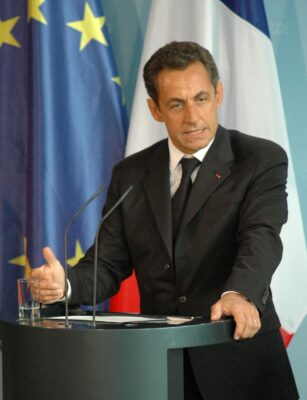Former French President Nicolas Sarkozy has begun serving a five-year prison sentence in Paris after being convicted of criminal conspiracy for allegedly accepting Libyan funds to finance his 2007 presidential campaign.
The 70-year-old ex-leader arrived at La Santé Prison on Tuesday afternoon, becoming the first former president in modern French history to be incarcerated. Before departing his home, Sarkozy told journalists, “An innocent man is being locked up.”
He was accompanied by his wife, Carla Bruni-Sarkozy, as they left their residence to meet family members and supporters gathered outside. Dozens of well-wishers waved French flags and chanted his name, while banners read: “Courage Nicolas, return soon” and “True France with Nicolas.”
Family members, including his children Jean, Pierre, Louis, and Giulia, and several grandchildren, were present to see him off, according to the Associated Press.
Among supporters in the crowd, Michelle Perié, 67, said she came “because there is anger and injustice,” adding that Sarkozy “is not like any other defendant; he holds state secrets and has always done his job with dignity.”
Commenting on the development, President Emmanuel Macron said: “The judiciary is independent, but it was normal on a human level to receive one of my predecessors in this context.”
Sarkozy’s lawyer, Christophe Ingrain, told BFM TV that the former president’s imprisonment “only strengthens his determination to prove his innocence,” revealing that Sarkozy plans to write a book about his prison experience.
Another lawyer, Jean-Michel Darrois, told France Info that Sarkozy was “mentally prepared” for solitary confinement. “He packed a few sweaters because it’s cold in prison, and earplugs because it’s noisy. Isolation is painful, but he’s prepared for it,” he said.
In a recent interview with La Tribune Dimanche, Sarkozy declared, “I’m not afraid of prison. I’ll hold my head high, even at the gates of La Santé. I’ll fight till the end.”
He also told Le Figaro that he plans to take three books, including Alexandre Dumas’ The Count of Monte Cristo, and ten family photographs, the maximum allowed.
His legal team confirmed that an appeal for his release would be filed soon.





